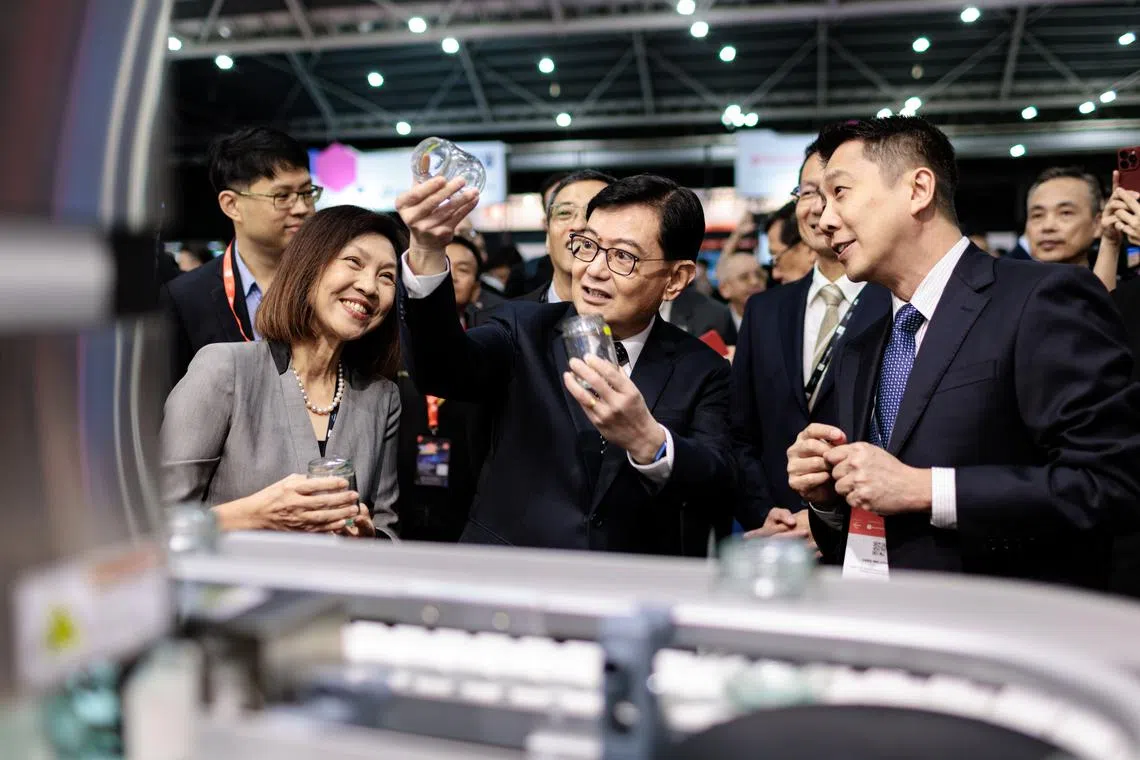Singapore Polytechnic, Federation of Malaysian Manufacturers ink MOU to groom more tech talent
The alliance will also support the new Johor-Singapore Special Economic Zone initiative

[KUALA LUMPUR] The Federation of Malaysian Manufacturers (FMM) – the largest private-sector economic organisation in Malaysia – has signed a memorandum of understanding (MOU) with Singapore Polytechnic, its first with an educational institution in Singapore.
The MOU, inked on the first day of the Industrial Transformation Asia-Pacific (Itap) event on Monday (Oct 14), will give a boost to the workforces in Singapore and Malaysia by enhancing skills in automation, data analysis and smart manufacturing.
The signing ceremony, held at the Singapore Expo, was witnessed by the Republic’s Deputy Prime Minister Heng Swee Keat.
In a news release, Singapore Polytechnic said the partnership will “foster industry-ready graduates and advance workforce transformation” by promoting joint research and development projects, as well as hosting workshops, training sessions and seminars.
The alliance will also support the new Johor-Singapore Special Economic Zone (JS-SEZ) initiative, which aims to boost cross-border trade and develop regional business ecosystems.

The signing of this MOU comes as Malaysia looks to train 60,000 high-skilled engineers for its tech industry, with the aim of elevating the country within the global semiconductor value chain and establishing itself as a prominent chip hub.
Navigate Asia in
a new global order
Get the insights delivered to your inbox.
In May 2024, the Malaysian government announced plans to invest at least RM25 billion (S$7.6 billion) over the next decade as part of the National Semiconductor Strategy.
FMM president Soh Thian Lai said the collaboration with the polytechnic was a “pivotal step” in modernising Malaysia’s manufacturing sector.
“(It) reinforces our commitment to regional cooperation, particularly through the JS-SEZ, which will open new opportunities for cross-border trade and sustainable growth,” he added.
SEE ALSO
The JS-SEZ was proposed in January 2024, when Singapore and Malaysia signed an MOU aimed at enhancing cross-border flows of goods and trade. The agreement is expected to be finalised by the end of this year. The zone is expected to cover an area of just over 3,500 square kilometres in southern Johor.
Singapore Polytechnic’s deputy principal of development Georgina Phua said: “By strengthening ties between industry and academia and promoting enterprise modernisation, we provide our graduates with the cutting-edge skills needed to thrive in the ever-changing manufacturing landscape.”
Other than the MOU with FMM, Singapore Polytechnic signed five other agreements at Itap on Monday. These were with Singtel, Advanced Manufacturing Training Academy, Cragar Industries, the International Centre for Industrial Transformation, and Monitor ERP.
AI to reshape manufacturing sector
In a speech at the start of Itap, Heng noted that manufacturing sits at the nexus of two major intersecting trends – the digital revolution and the green transition.
“The application of AI (artificial intelligence) will certainly reshape the manufacturing sector,” he said, adding that a Japanese technology executive whom he met in Tokyo last week described AI as a game changer in the areas of discovery, creativity and productivity.
“On each of these fronts, AI will have a transformative impact on the manufacturing sector. At the same time, the sector globally also accounts for around one-fifth of global carbon emissions,” he said.
“It is critical that new green and sustainable solutions are enabled and deployed by the sector to support and accelerate global efforts to combat climate change. For us here in Singapore, and indeed in many parts of South-east Asia and Asia, and I would say globally, climate change is existential.”
Decoding Asia newsletter: your guide to navigating Asia in a new global order. Sign up here to get Decoding Asia newsletter. Delivered to your inbox. Free.
Copyright SPH Media. All rights reserved.





